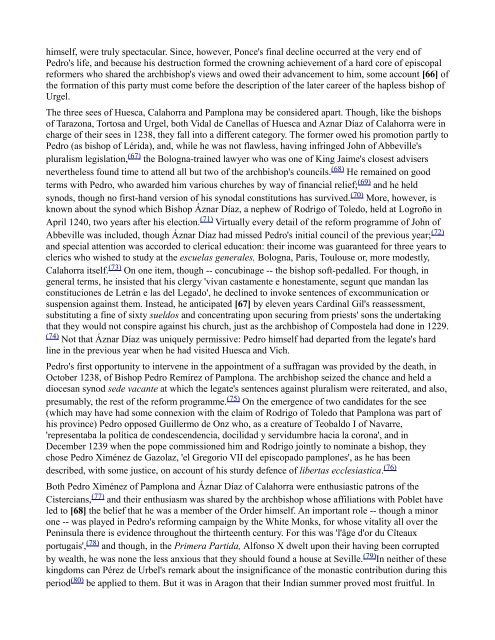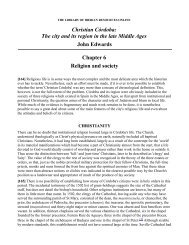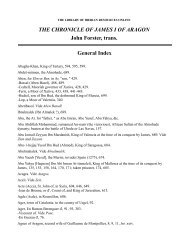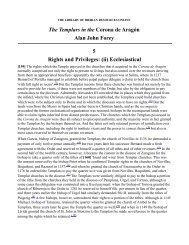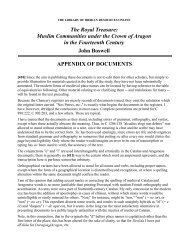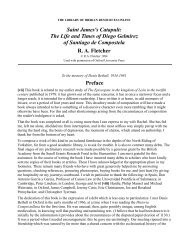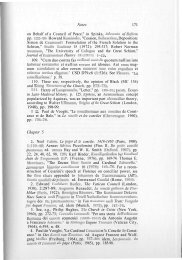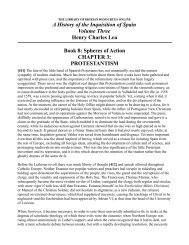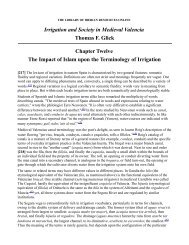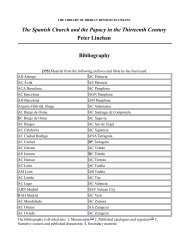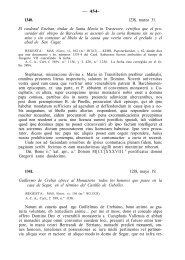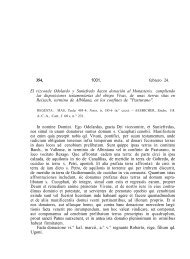Chapter 4 - The Library of Iberian Resources Online
Chapter 4 - The Library of Iberian Resources Online
Chapter 4 - The Library of Iberian Resources Online
Create successful ePaper yourself
Turn your PDF publications into a flip-book with our unique Google optimized e-Paper software.
himself, were truly spectacular. Since, however, Ponce's final decline occurred at the very end <strong>of</strong><br />
Pedro's life, and because his destruction formed the crowning achievement <strong>of</strong> a hard core <strong>of</strong> episcopal<br />
reformers who shared the archbishop's views and owed their advancement to him, some account [66] <strong>of</strong><br />
the formation <strong>of</strong> this party must come before the description <strong>of</strong> the later career <strong>of</strong> the hapless bishop <strong>of</strong><br />
Urgel.<br />
<strong>The</strong> three sees <strong>of</strong> Huesca, Calahorra and Pamplona may be considered apart. Though, like the bishops<br />
<strong>of</strong> Tarazona, Tortosa and Urgel, both Vidal de Canellas <strong>of</strong> Huesca and Aznar Díaz <strong>of</strong> Calahorra were in<br />
charge <strong>of</strong> their sees in 1238, they fall into a different category. <strong>The</strong> former owed his promotion partly to<br />
Pedro (as bishop <strong>of</strong> Lérida), and, while he was not flawless, having infringed John <strong>of</strong> Abbeville's<br />
pluralism legislation, (67) the Bologna-trained lawyer who was one <strong>of</strong> King Jaime's closest advisers<br />
nevertheless found time to attend all but two <strong>of</strong> the archbishop's councils. (68) He remained on good<br />
terms with Pedro, who awarded him various churches by way <strong>of</strong> financial relief; (69) and he held<br />
synods, though no first-hand version <strong>of</strong> his synodal constitutions has survived. (70) More, however, is<br />
known about the synod which Bishop Áznar Díaz, a nephew <strong>of</strong> Rodrigo <strong>of</strong> Toledo, held at Logroño in<br />
April 1240, two years after his election. (71) Virtually every detail <strong>of</strong> the reform programme <strong>of</strong> John <strong>of</strong><br />
Abbeville was included, though Áznar Díaz had missed Pedro's initial council <strong>of</strong> the previous year; (72)<br />
and special attention was accorded to clerical education: their income was guaranteed for three years to<br />
clerics who wished to study at the escuelas generales, Bologna, Paris, Toulouse or, more modestly,<br />
Calahorra itself. (73) On one item, though -- concubinage -- the bishop s<strong>of</strong>t-pedalled. For though, in<br />
general terms, he insisted that his clergy 'vivan castamente e honestamente, segunt que mandan las<br />
constituciones de Letrán e las del Legado', he declined to invoke sentences <strong>of</strong> excommunication or<br />
suspension against them. Instead, he anticipated [67] by eleven years Cardinal Gil's reassessment,<br />
substituting a fine <strong>of</strong> sixty sueldos and concentrating upon securing from priests' sons the undertaking<br />
that they would not conspire against his church, just as the archbishop <strong>of</strong> Compostela had done in 1229.<br />
(74) Not that Áznar Díaz was uniquely permissive: Pedro himself had departed from the legate's hard<br />
line in the previous year when he had visited Huesca and Vich.<br />
Pedro's first opportunity to intervene in the appointment <strong>of</strong> a suffragan was provided by the death, in<br />
October 1238, <strong>of</strong> Bishop Pedro Remírez <strong>of</strong> Pamplona. <strong>The</strong> archbishop seized the chance and held a<br />
diocesan synod sede vacante at which the legate's sentences against pluralism were reiterated, and also,<br />
presumably, the rest <strong>of</strong> the reform programme. (75) On the emergence <strong>of</strong> two candidates for the see<br />
(which may have had some connexion with the claim <strong>of</strong> Rodrigo <strong>of</strong> Toledo that Pamplona was part <strong>of</strong><br />
his province) Pedro opposed Guillermo de Onz who, as a creature <strong>of</strong> Teobaldo I <strong>of</strong> Navarre,<br />
'representaba la política de condescendencia, docilidad y servidumbre hacia la corona', and in<br />
December 1239 when the pope commissioned him and Rodrigo jointly to nominate a bishop, they<br />
chose Pedro Ximénez de Gazolaz, 'el Gregorio VII del episcopado pamplones', as he has been<br />
described, with some justice, on account <strong>of</strong> his sturdy defence <strong>of</strong> libertas ecclesiastica. (76)<br />
Both Pedro Ximénez <strong>of</strong> Pamplona and Áznar Díaz <strong>of</strong> Calahorra were enthusiastic patrons <strong>of</strong> the<br />
Cistercians, (77) and their enthusiasm was shared by the archbishop whose affiliations with Poblet have<br />
led to [68] the belief that he was a member <strong>of</strong> the Order himself. An important role -- though a minor<br />
one -- was played in Pedro's reforming campaign by the White Monks, for whose vitality all over the<br />
Peninsula there is evidence throughout the thirteenth century. For this was 'l'âge d'or du Cîteaux<br />
portugais', (78) and though, in the Primera Partida, Alfonso X dwelt upon their having been corrupted<br />
by wealth, he was none the less anxious that they should found a house at Seville. (79) In neither <strong>of</strong> these<br />
kingdoms can Pérez de Urbel's remark about the insignificance <strong>of</strong> the monastic contribution during this<br />
period (80) be applied to them. But it was in Aragon that their Indian summer proved most fruitful. In


